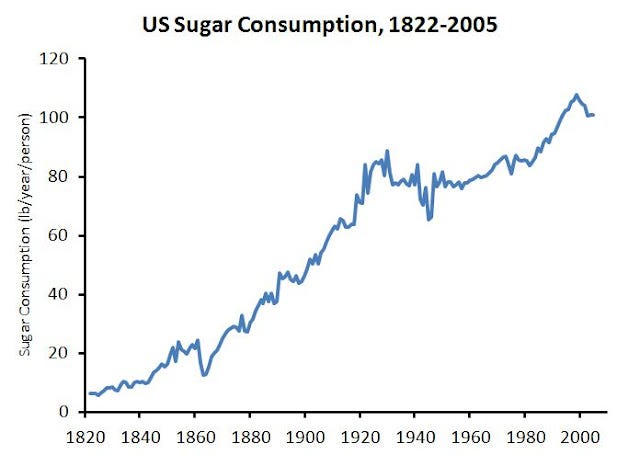Conquering Sugar Addiction: A Path to Healthier Living
Written on
Understanding Sugar Addiction
The moment I indulge in my favorite chocolate bar or a sweet treat, I often find it challenging to stop and end up in a prolonged binge on sugary snacks. This experience has led me to minimize sugar intake whenever possible, particularly avoiding sugary delights.
While the dangers of excessive sugar consumption are widely recognized, the reasons behind it are less understood. Whether you're a candy lover or a health enthusiast, my goal is to share essential insights on this topic and provide effective strategies for overcoming sugar addiction.
How detrimental is sugar? Are the effects on our bodies irreversible? What is our actual sugar intake? Why is it so hard to resist? In which products is sugar commonly found? What are the consequences of overconsumption? How can we effectively combat this addiction? Below are specific tips to help.
Today's Question:
What is the estimated annual sugar consumption in developed nations like the USA?
Take a moment to ponder this; I will reveal the answer shortly.
Sugar: An Addictive Substance
Sugar can be as addictive as some illicit drugs, and the withdrawal symptoms experienced when cutting it out can mirror those of drug addiction. If you've ever attempted to eliminate sugar completely without proper preparation, you likely understand this struggle.
Why is Sugar So Addictive?
Our evolution has conditioned us to seek pleasure through consuming items that enhance survival chances. Historically, sugar in fruits indicated more calories and energy for vital activities such as hunting and nurturing. This evolutionary trait explains why consuming sugar triggers pleasurable feelings today.
This is why I often find myself unable to control my sweet cravings and end up devouring everything nearby.

Why Don't Bitter and Sour Flavors Have the Same Effect?
These tastes are frequently linked to spoiled or harmful food. It doesn't imply a dislike for these flavors; rather, they don't prompt significant dopamine release in the brain. Conversely, salty flavors, which can also be addictive, warrant a separate discussion.
The Role of the Food Industry
Big corporations exploit this knowledge by adding sugar to countless products, enticing us into a cycle of addiction. Sugar can be found in deli meats, cheeses, sausages, cereals, sauces, breads, dairy products, juices, and much more.
Brain Adaptation and Increasing Consumption
For our brains to achieve the same dopamine response, they require larger quantities of sugar over time. This principle applies to all forms of addiction, including alcohol, drugs, and sugar, leading to ever-increasing sugar consumption each year.
Answer to Today's Question:
The annual sugar intake in developed countries like the USA is staggering.

As illustrated, sugar consumption continues to rise. Although the increase has slowed since 2005, the trend remains upward. With easy access to food, developed nations consume astonishing amounts of sugar, averaging between 80 to 110 pounds annually.
Consequences of Excessive Sugar Intake
The health risks associated with high sugar consumption include:
- Type 2 diabetes
- Heart disease and circulatory issues
- Hypertension
- Obesity (sugar decreases feelings of fullness)
- Liver damage
- Impaired concentration and memory
- Changes in taste perception
- Dental cavities
- Skin issues like acne
- Increased risk of premature death
Are the Effects of Sugar Consumption Permanent?
Fortunately, the effects are not permanent. Positive changes in brain function and taste perception can occur relatively quickly after reducing sugar intake.
A Practical Approach to Overcoming Sugar Addiction
- Gradually reduce sugar intake—avoid drastic changes that can lead to failure and binges.
- Incorporate regular physical activity; even short walks can help regulate blood sugar and reduce cravings.
- Remove candy and sugary snacks from your home—buy only what you need to satisfy immediate cravings.
- Replace sugary beverages with zero-calorie alternatives or eventually water.
- Check product labels for sugar content and choose lower-sugar options.
- Prepare healthier snacks as substitutes for sweets, such as nuts or yogurt.
- Consider sugar alternatives like stevia or erythritol to ease the transition.
- Explore low-carb or ketogenic diets if suitable.
- Seek support from family or friends to help maintain accountability.
- Consult a dietitian or nutritionist for professional guidance.
- If possible, utilize meal delivery services for healthy options.
- Educate yourself about nutrition and health to enhance motivation.
Thank you for reading this far. I sincerely wish you success on your journey to better health and hope you can overcome sugar addiction.
Do others struggle with sugar cravings? If you have other effective strategies, please share in the comments.
The first video titled "Here's How to Break Your Sugar Addiction in 10 Days" offers practical tips and insights into effectively reducing your sugar intake.
The second video, "Beat Your Sugar Addiction in 10 Days!" presents strategies and motivation for overcoming sugar cravings.